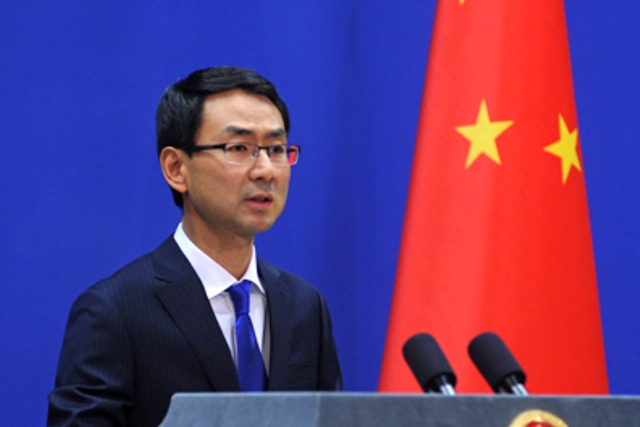China urges UN to support Philippines' war on drugs

Chinese Foreign Ministry spokesman Geng Shuang issued the statement after 45 of 47 members of the United Nations Human Rights Council (UNHRC) urged the Philippine government to end extrajudicial killings and withdraw its plan to revive the death penalty. FMPRC/File
MANILA, Philippines - China has called on the international community to respect the Philippines’ sovereign prerogative in combating the drug menace in the country.
Chinese Foreign Ministry spokesman Geng Shuang issued the statement after 45 of 47 members of the United Nations Human Rights Council (UNHRC) urged the Philippine government to end extrajudicial killings and withdraw its plan to revive the death penalty.
“Drugs are the common enemy for all human beings, bringing pain to many developing countries, including China. China supports President Duterte and the Philippine government in combating drug-related crimes in accordance with the law,” Geng said in a press conference on Thursday night.
“We hope the international community can respect the judicial sovereignty of the Philippines and support its efforts in fighting drug-related crimes through cooperation,” he added.
Geng also called on UNHRC member-states to be objective in reviewing human rights situations in other countries.
On May 8, the 27th session of Universal Periodic Review (UPR) of the UNHRC assessed the human rights situation in the Philippines.
Several countries including China, Cuba, Russia and Venezuela made positive comments and lauded the efforts and achievements made by the Philippines in eliminating poverty, promoting socio-economic development as well as improving and protecting human rights.
Geng said the UPR was an important mechanism for UN member-states to conduct dialogue and cooperation on an equal footing in the area of human rights.
“We hope various parties can be objective and fair in viewing the human rights conditions in different countries and promote the human rights cause through dialogue and cooperation,” he said.
The Philippines received a total of 257 recommendations – the highest – from among the participating states. Recommendations after review averaged 220.
Extrajudicial killings, death penalty and human trafficking were the core issues on which the recommendations were based.
Around 8,000 suspected drug offenders have died since the Duterte administration launched a brutal campaign against illegal drugs last year.
Human rights advocates claimed that the drug war has encouraged summary executions and human rights violations, but officials have denied the allegation.
Cayetano appointment welcomed
Meanwhile, the Chinese government is looking forward to working closely with incoming secretary of the Department of Foreign Affairs (DFA) Sen. Alan Peter Cayetano to further strengthen relations betwee the two nations.
“We welcome the appointment and congratulate Mr. Cayetano. China is ready to work with him to implement the high-level consensus and keep deepening practical cooperation to push forward China-Philippines relations for greater benefits to our peoples and regional peace and stability,” Geng said.
Prior to his appointment as DFA secretary, Cayetano headed the Senate foreign relations committee. He was President Duterte’s runningmate in last year’s election.
Last week, Cayetano led the Philippine delegation to the UNHRC’s UPR of the Philippines in Geneva, Switzerland where he defended the Duterte administration’s war on drugs.
Geng said that since last year, relations between the Philippines and China “have achieved all-round improvement and bilateral cooperation has entered a new stage.”
“Cooperation across the board has recovered and yielded fruitful outcomes. Our relationship is making overall progress,” he said.
Duterte is among 29 heads of state and government leaders who will attend the Belt and Road Forum on International Cooperation in Beijing from May 14 to 15.
During his first visit to Beijing in October last year, Duterte brought home $24 billion worth of investment pledges and infrastructure projects.
- Latest
- Trending


























